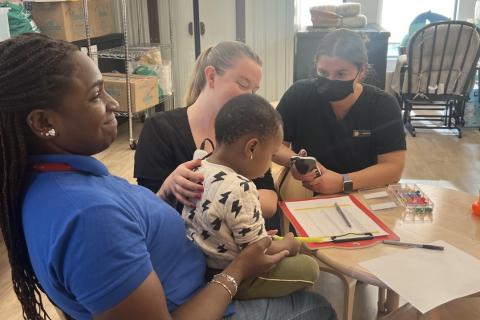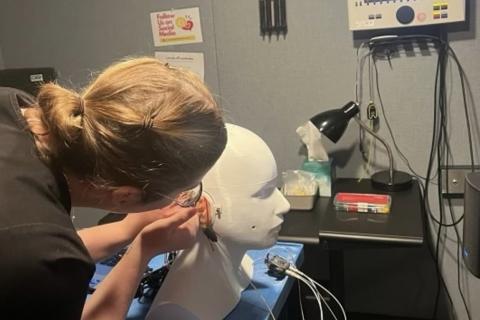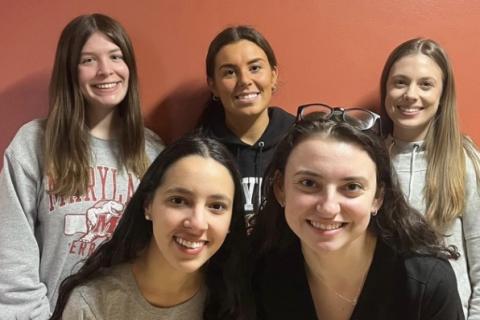What is this program about?
The Doctoral Program in Clinical Audiology (CAUD) is a comprehensive, integrated educational and clinical program designed to train clinical audiologists to serve the hearing health care needs of individuals with hearing loss, from newborns to the very old. Through extensive coursework and varied clinical practicum experiences, the CAUD program contributes substanitally to the academic and clinical practicum requirements for the Certificate of Clinical Competence (CCC). It entails four years of full-time study that includes graduate-level coursework, on-site and off-campus clinical placements, a clinically oriented capstone research project, and a fourth year clinical internship residency.
What is the focus?
- Cutting-edge clinical and research issues, especially cochlear implants, assistive hearing technology, and auditory electrophysiology;
- Significant exposure to diverse clinical populations, assessment procedures, and treatment methodologies;
- Evidence-based practice;
- Providing students with clinical research experiences;
- Training students to evaluate the efficacy of emerging technologies and procedures;
- Extensive hands-on experiences in classes, clinic, and the laboratory.
Why is the program great?
- Graduate coursework is offered by world-renowned faculty with specific expertise in the courses they teach;
- Students receive exceptionally high quality clinical supervision with the goal of fostering readiness for independence in clinical practice;
- Students have the opportunity to be fully engaged in research with internationally recognized faculty researchers in the department, on the UMD campus, and in the local vicinity, and many publish their work or present their work at national conferences;
- Numerous, off-site clinical placements in the Baltimore-Washington Metropolitan area are unparalleled (e.g., NIH Clinical Center, Walter Reed Military Medical Center, Children’s Hospital in DC, Johns Hopkins University Hospital, etc.), and permit students to explore clinical specialties of interest;
- Small class cohorts ensure individualized attention by program faculty;
- Department-wide seminar series brings highly respected faculty to campus to interact with students;
- 100% success rate in passing Praxis exam and placing students in 4th-year clinical internships and professional positions shortly after graduation.
What can I expect from the program?
- Number of credits required: 93 (includes academic and clinical courses)
- Typical number of years to complete: 4
- Semesters in on-site clinic: 4; Semesters in off-site clinic: 3 (range of 2-4)
- Full-time clinical internship residency: 12 months
- Prerequisites: 5 undergraduate hearing and speech courses in specific areas
- Typical cohort size: 7 (range of 6-10)
What are the goals of the AuD program?
The overall goal of the Doctoral Program in Clinical Audiology (CAUD) at the University of Maryland is to train the next generation of highly qualified clinical audiologists who will provide well-informed and superior hearing health care services to individuals across the lifespan and from diverse backgrounds.
Specific goals are as follows:
- Goal 1: Graduate CAUD students will gain a deep understanding of auditory/vestibular neuroscience and will become critical consumers of audiology research; they will apply this knowledge to clinical practice/interventions with a broad spectrum of populations in different clinical settings;
- Goal 2: Graduate CAUD students will develop an understanding of the underlying pathological conditions that cause dysfunction of the auditory and vestibular systems and how these pathologies manifest on a broad range of physiological and behavioral measures of hearing and vestibular function.
- Goal 3: Graduate CAUD students will have a deep understanding of the goals of a comprehensive audiological assessment, how to conduct this assessment, and how to interpret results to inform care planning, including counseling of patients and their families.
- Goal 4: Graduate CAUD students will gain understanding and competency in developing an evidence-based hearing health care plan to include appropriate amplification, cochlear implants, assistive hearing technologies, and aural rehabilitation, for pediatric and adult patients in a variety of settings.
- Goal 5: Graduate CAUD students will gain experience working with diverse and often underserved populations and will demonstrate cultural sensitivity and competence in providing effective hearing health care to patients of different backgrounds.
- Goal 6: Graduate CAUD students will demonstrate knowledge and application of the ASHA and AAA Codes of Ethics and State of Maryland laws specific to patients treated in the State of Maryland as reflected in clinical practice. Graduate students will grow in their capacity to demonstrate appropriate professional conduct within a comprehensive care setting, within the field, and within the communities in which we serve.
- Goal 7: Graduate CAUD students will learn about audiology practice, supervision, and management, through coursework and by engaging in quality improvement strategies and working as a multidisciplinary team to improve hearing health care.
- Goal 8: Graduate CAUD students will develop effective oral and written communication skills to convey pertinent information to clients, families, and other professionals about the nature and management of communication disorders.
View the full program description here.
More about the program:
Prospective Students
- Program Directors
- Open Houses
- How to Apply
- International Students
- FAQ's
- Pre-requisite Courses
- Funding Opportunities
Current Students






